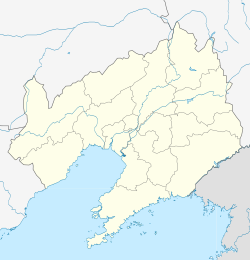Xialuhe Korean Ethnic Township
Xialuhe Korean Ethnic Township
| |
|---|---|
| Coordinates (Xialuhe Township government): 40°53′35″N 125°30′53″E / 40.8931°N 125.5147°E | |
| Country | China |
| Province | Liaoning |
| Prefecture-level city | Dandong |
| Autonomous county | Kuandian |
| Area | |
• Total | 269.84 km2 (104.19 sq mi) |
| Population (2018)[1] | |
• Total | 10,887 |
| • Density | 40/km2 (100/sq mi) |
| Time zone | UTC+8 (China Standard) |
Xialuhe Korean Ethnic Township (simplified Chinese: 下露河朝鲜族乡; traditional Chinese: 下露河朝鮮族鄉; pinyin: Xiàlùhé Cháoxiǎnzú Xiāng), also known as Haroha Korean Ethnic Township (Korean: 하로하조선족향; Hanja: 下露河朝鮮族鄕; RR: Haroha Joseonjok Hyang; MR: Haroha Chosŏnjok Hyang),[2] is an ethnic township in Kuandian Manchu Autonomous County, Dandong, Liaoning Province, China.[3] Located 63.8 kilometres (39.6 mi) east of the county center,[3] the township spans an area of 269.84 square kilometres (104.19 sq mi),[1] and is home to 10,887 people as of 2018.[1]
History
[edit]Throughout the 1920s on through the 1940s, the area of present-day Xialuhe was a hotbed of Korean independence armies, who often sparred with occupying Japanese forces.[4]
In 1958, Xialuhe Township was created.[3][2] Xialuhe was re-designated from a township to an ethnic township in 1987.[3]
Administrative divisions
[edit]Xialuhe is divided into 6 administrative villages.[5]
- Majiazi/Magaja (马架子村, 마가자촌)[4]
- Lianjiang (连江村)
- Tongjiang/Tonggang (通江村, 통강촌)[4]
- Chuangou/Cheongu(川沟村, 천구촌)[4]
- Shuanglian (双联村)
- Shuangguang (双广村)
Demographics
[edit]Xialuhe Korean Ethnic Township has a population of 10,887 as of 2018.[1]
As of 2010, the ethnic township had a population of 10,370, of which there are 5,371 males and 4,999 females.[6] That year, there were 1,327 people aged 14 and under, 7,941 people aged 15 to 64, and 1,102 people aged 65 and up.[6]
A 2009 estimate placed Xialuhe's population at about 11,200.[4]
As of 2007, there were approximately 1,100 ethnic Koreans living in Xialuhe,[2] however, Xialuhe's ethnic Korean population has declined in recent years,[4] largely due to low birth rates, migration to urban areas, and emigration to South Korea.[4] By the 2010s, a local Korean language newspaper reported that many schoolchildren in Xialuhe cannot speak Korean.[4]
Education
[edit]Since the establishment of the People's Republic of China, a number of bilingual schools teaching in both Mandarin Chinese and Korean have been established in Xialuhe.[4] However, due to the decline in the local ethnic Korean population, a number of these schools have been closed or merged in recent years.[4]
References
[edit]- ^ a b c d e 中国县域统计年鉴·2019(乡镇卷) (in Chinese). Beijing: 中国统计出版社, 国家统计局农村社会经济调查司. May 2020. p. 118. ISBN 9787503791390.
- ^ a b c 하로하조선족향 [Haroha Korean Ethnic Township]. www.okpedia.kr (in Korean). Archived from the original on 2021-06-28.
- ^ a b c d 下露河朝鲜族乡 [Xialuhe Korean Ethnic Township]. xzqh.org (in Chinese). 2009-04-28. Archived from the original on 2020-07-08. Retrieved 2020-07-08.
- ^ a b c d e f g h i j 진통을 겪는 하로하 9년일관제학교 조선족반. www.iybtv.com (in Korean). Yanbian Radio and Television Broadcasting Station. 2018-07-04. Archived from the original on 2021-06-28. Retrieved 2021-06-28.
- ^ 2019年统计用区划代码和城乡划分代码. stats.gov.cn (in Chinese). 2019. Archived from the original on 2020-07-08. Retrieved 2020-07-08.
- ^ a b "Xiàlùhé Cháoxiānzú Xiāng". www.citypopulation.de. Archived from the original on 2021-06-27. Retrieved 2021-06-27.

